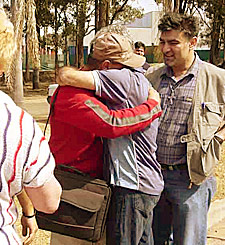After five years in detention, a legal nobody in a quagmire of immigration law, Amir Mesrinejad has been released from Villawood Detention Centre.
 The Iranian Christian and asylum seeker who came to the attention of the Australian public when it was revealed he faced the death penalty for his conversion if deported, has been released into the community.
The Iranian Christian and asylum seeker who came to the attention of the Australian public when it was revealed he faced the death penalty for his conversion if deported, has been released into the community.
"I think it's a triumph of common sense and compassion," says Amir's immigration lawyer, Michael Kah.
While Amir's case bounced between lawyers, the Department of Immigration and Multicultural and Indigenous Affairs officials (DIMIA) and the Minister, Senator Amanda Vanstone, the 41-year-old completed nine external theology subjects through Moore Theological College.
Even with his life on hold, he was offered a job on the ministry team at St Paul's Carlingford on the strength of his studies and the Christian leadership he exercised inside Villawood.
He was a man with a life laid out before him, but he lacked the freedom to pick it up.
The break-through came Friday morning.
Mr Kah received a call from a DIMIA case worker to say that the asylum seeker would be set free at 12:30pm the very next day.
But the real shock came when Mr Kah read the paper-work.
Amir would not be granted a temporary protection visa " instead, he has received a permanent residency visa.
"This is the best outcome that we could have hoped for," Mr Kah says.
"The visa will actually be granted Saturday and he is then a permanent resident of Australia," he told Anglican Media Friday afternoon.
Amir's champions asked that the news of his release be delayed until the day after his release because they did not wish crowds to cause him distress after such a long wait for freedom.
But one person who wasn't going to miss that much-prayed-for moment is long-time friend Stephen Morris.
"It's really exciting news after such a long and difficult struggle of trying to get him out of there," says Mr Morris.
Christ Church, St Ives parishioner Stephen Morris started visiting Amir at Villawood three years ago when he became aware of the conditions of asylum seekers.
The horticultural scientist says fighting for Amir's freedom has been a long struggle.
"We've had a long haul, going all the way to the high court and to and from the immigration minister several times. It's been a pretty big challenge for a non-lawyer."
"We have had some terrific help form lots and lots of churches and lots of parliamentarians like Bruce Baird and other senior politicians who have been supportive."
Mr Morris says Amir has been a Christian role model to others in Villawood detention centre.
"Amir has been a real support. He has natural leadership qualities and is a strong committed Christian. In the last few years he has been a real tower of strength for the asylum seekers out at Villawood."
"Virtually all had been freed over last year or two, and Amir has been supporting them and helping them, keeping their strength and faith up."
"He was finding it harsh to be one of the few left and was getting depressed before he was offered the letter for his case renewal three months ago."
Mr Kah says Amir Mesrinejad's case for freedom had been rejected several times prior to this date.
He says at one stage DIMIA made the seemingly unrealistic requirement of a favourable police report from the very country that posed a threat to his life.
"We sought a waiver for that request for obvious reasons and that waiver was granted," he says.
The last attempt to place the matter before the minister was delayed for months by the lack of a clearance document from ASIO which eventually arrived.
But now the way is clear for Amir to enjoy all the opportunities of an Australian citizen.
"You need to be a permanent resident for a couple of years to apply to be a citizen," Mr Kah says, "though I understand the Prime Minister is intending on extending that waiting period to three years."
"I’m not aware what Amir's intentions are in respect of citizenship; I think he will be just overjoyed to be a permanent resident."
Amir will live in Granville with a former asylum seeker Daryoush Dibabar who is a lay leader of an Iranian church in Guildford.
Amir now looks likely to take up a position as a Ministry Training Strategy apprentice at St Paul's, Carlingford.
"They have raised money for him to do ministry to Iranian people. But he will probably not start for a few months because it's a major psychological shock to be locked up for five years. It takes a while to get your head back to normal."
"Amir has been a real encouragement to me personally," Mr Morris says.

































